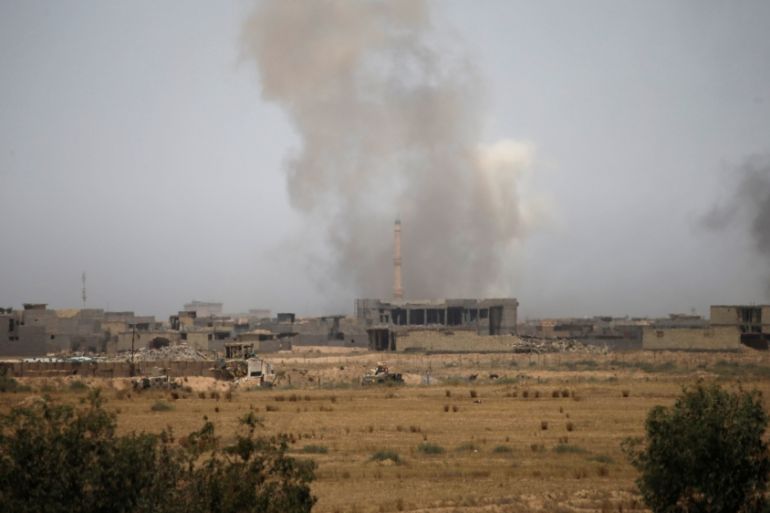Iraq report brings little solace to war-torn country
US invasion left country in ruins, Iraqis say, as protesters gather in London for official report on Britain’s role.

As anti-war protesters converged in London on Wednesday for the release of the Iraq Inquiry, an official report into Britain’s involvement in the Iraq war, residents of Baghdad were still mourning the latest violence to grip their country.
|
|
The report by British civil servant John Chilcot comes 13 years after the 2003 invasion of Iraq by coalition forces, and just days after a massive suicide bombing killed 250 people in the Karada neighbourhood of Baghdad. The Islamic State of Iraq and the Levant (ISIL, also known as ISIS) has claimed responsibility for the blast, which has been described as the deadliest attack in Iraq since the 2003 invasion.
With their country deep in turmoil, average Iraqis told Al Jazeera that the release of the Chilcot report – which has spurred fresh calls for former British Prime Minister Tony Blair to be prosecuted for war crimes – would provide little consolation.
“People around the world are preparing for [Eid al-Fitr] holidays in a cheerful way. They buy new things for their children, new toys and new clothes. But in Iraq, we are buying coffins for our beloved ones,” Baghdad resident Mohammad Jawad, 25, told Al Jazeera.
“Blair and [former US President George W Bush] are responsible for every life lost in Iraq, from 2003 until now,” Jawad added. “The invasion has left our country in chaos, and in ruins. They overthrew [former Iraqi President Saddam Hussein]’s regime without considering an appropriate political alternative, and now all we have are dead bodies everywhere.”
READ MORE: Will Fallujah put an end to ISIL in Iraq?
On March 19, 2003, Bush announced the launch of military operations “to disarm Iraq, to free its people and to defend the world from grave danger”. That night, US and coalition forces began launching missiles and bombs at targets in Iraq; within weeks, the country was under occupation. Saddam was captured in December 2003 and later executed, but the war dragged on for another eight years, giving rise to new internal conflicts.
Thirteen years later, Iraq is far from recovery. Taking advantage of the instability, ISIL has seized swaths of the country, declaring its capital in Mosul. The Iraqi government, meanwhile, is viewed by many residents as weak and unable to restore order.
“Iraq as a country has become a battlefield for regional and international powers, and this is one of the most critical consequences of the invasion,” Iraqi political analyst Hadi al-Isami told Al Jazeera, noting the Chilcot report will do nothing to assuage the country’s plight.
”They
’s regime without considering an appropriate political alternative, and now all we have are dead bodies everywhere.”]
“The Iraqi government, since the invasion, has failed to maintain stability. The coalition has left the country under the control of a new political elite that is consumed by sectarianism and corruption, and no committee can correct that,” Isami added. “[The] political struggle in Iraq is making the situation even worse. The Sunnis in Iraq are not properly represented, neither in the parliament nor in the government.”
Much of the Sunni population considers Iraq’s current constitution to be a direct result of the occupation, and they are calling for a new constitution to be adopted.

For the past two years, the Iraqi army has struggled to regain control over vast parts of the country that fell to ISIL – even struggling to maintain security in the capital. Baghdad still suffers daily explosions, car bombs and suicide attacks, mainly in crowded areas.
The ongoing fighting between Iraqi forces and ISIL has displaced more than three million Iraqis and left an estimated 10 million in need of humanitarian assistance, according to the United Nations. The UN has described the country’s crisis as “one of the world’s worst”.
In a televised interview last October, Blair offered an apology for using what he described as misleading intelligence, and for failing to prepare for the aftermath of the invasion. Asked whether the Iraq invasion was the principal cause of ISIL’s rise, Blair said: “I think there are elements of truth in that.”
WATCH: Did the US occupation create ISIL?
Back in Iraq, resident Hussein Kathim Jassim, 44, complained that the situation in his country has spiralled since the 2003 invasion, with all aspects of daily life getting worse.
“Saddam was cruel, he was a dictator, but we knew that. We learned how to survive during his rule; we had at least security in the streets. The law was maintained,” Jassim told Al Jazeera.
“When the coalition forces invaded Iraq, we thought we would have democracy and dignity. Look at us now; tens, if not hundreds, die every day. We don’t enjoy even the basic human rights,” he added.
“The political parties that took power after the invasion are no better than the Baath party. They are all corrupt. They lead a luxurious lifestyle while Iraqis die every day.”